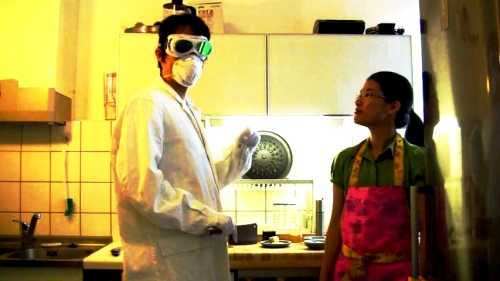Two ethnic Koreans have raised more than $1,500 to bring a taste of kimchi to the German capital.
Kate Hers and Hanjo Rhee are inviting people to barter for the spicy Korean side dish at an art installation in a Berlin bar during November, the time when people here traditionally make the food.
They asked for donations to run the project via an online fundraising website, and have now surpassed their target budget to offer kimchi as an alternative to sauerkraut ― Germany’s own fermented cabbage staple.
 |
Kate Hers and Hanjo Rhee prepare to make kimchi in Berlin (Kate Hers) |
Visual artist Hers, will invite her “customers” to swap their countries’ cultural items for portions of kimchi in a bid to encourage in multiculturalism and tolerance.
“Dr. Rhee’s Kimchi Shop” is to run for one week in Berlin art bar Das Gift with the bartered “cultural artifacts” collected and displayed as the exhibition goes on.
“One of the reasons we wanted to do this project in Berlin is because of the controversies regarding immigration, integration, and multiculturalism in Germany,” said Hers.
“We thought this would be an excellent way to bring critical discussion to these issues in an interactive, accessible, and fun way.”
Hers was born in South Korea but raised as an adoptee in the U.S. and Rhee is half Korean, half German.
“We’re Korean but we don’t speak Korean. One of our main ideas to get across is that we can define our own identity as diasporic Koreans,” Hers added.
“Just because we don’t speak Korean doesn’t make us any less worthy to call ourselves Korean or to make kimchi. We have been making kimchi together for the past two years and Hanjo has been making it since birth.
“A few weeks before the exhibition, we will make about 20 kilograms of our special homemade kimchi and can them in airtight jars.”
Hers said that while some Asian markets in Berlin sold kimchi, it was made less spicy than it was in Korea. She said people of many nationalities had already sampled and praised their kimchi ― called Kimtschi in Germany.
There are more than 30,000 Koreans in Germany and more than 6,000 living in Berlin.
Most came as nurses or miners in the 1960s and 70s. However, Hers said many Berliners still had much to learn about Korean culture.
But Hers added: “I think for the most part, most Germans don’t really have so much knowledge about Korea or Korean culture. Many I have talked to don’t even know what kimchi is.
“However, Korean food is starting to become really popular in Berlin and there are so many new restaurants popping up all over the place. It’s very popular with the international crowd.
“We want to share this aspect of Korean culture with all those interested. You don’t have to be Korean to make good kimchi!”
By Kirsty Taylor (
kirstyt@heraldcorp.com)








